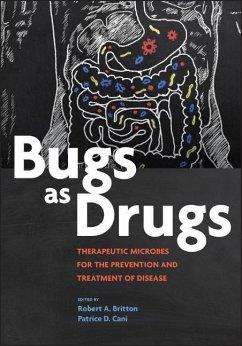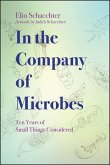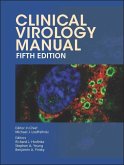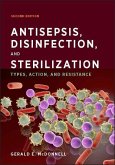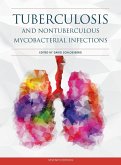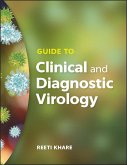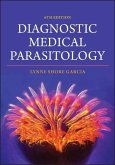Examining the enormous potential of microbiome manipulation to improve health
Associations between the composition of the intestinal microbiome and many human diseases, including inflammatory bowel disease, cardiovascular disease, metabolic disorders, and cancer, have been elegantly described in the past decade. Now, whole-genome sequencing, bioinformatics, and precision gene-editing techniques are being combined with centuries-old therapies, such as fecal microbiota transplantation, to translate current research into new diagnostics and therapeutics to treat complex diseases. Bugs as Drugs provides a much-needed overview of microbes in therapies and will serve as an excellent resource for scientists and clinicians as they carry out research and clinical studies on investigating the roles the microbiota plays in health and disease.
In Bugs as Drugs, editors Robert A. Britton and Patrice D. Cani have assembled a fascinating collection of reviews that chart the history, current efforts, and future prospects of using microorganisms to fight disease and improve health. Sections cover traditional uses of probiotics, next-generation microbial therapeutics, controlling infectious diseases, and indirect strategies for manipulating the host microbiome. Topics presented include:
_ How well-established probiotics support and improve host health by improving the composition of the intestinal microbiota of the host and by modulating the host immune response.
_ The use of gene editing and recombinant DNA techniques to create tailored probiotics and to characterize next-generation beneficial microbes. For example, engineering that improves the anti-inflammatory profile of probiotics can reduce the number of colonic polyps formed, and lactobacilli can be transformed into targeted delivery systems carrying therapeutic proteins or bioengineered bacteriophage.
_ The association of specific microbiota composition with colorectal cancer, liver diseases, osteoporosis, and inflammatory bowel disease. The gut microbiota has been proposed to serve as an organ involved in regulation of inflammation, immune function, and energy homeostasis.
_ Fecal microbiota transplantation as a promising treatment for numerous diseases beyond C. difficile infection. Practical considerations for using fecal microbiota transplantation are provided, while it is acknowledged that more high-quality evidence is needed to ascertain the importance of strain specificity in positive treatment outcomes.
Because systems biology approaches and synthetic engineering of microbes are now high-throughput and cost-effective, a much wider range of therapeutic possibilities can be explored and vetted.
Hinweis: Dieser Artikel kann nur an eine deutsche Lieferadresse ausgeliefert werden.
Associations between the composition of the intestinal microbiome and many human diseases, including inflammatory bowel disease, cardiovascular disease, metabolic disorders, and cancer, have been elegantly described in the past decade. Now, whole-genome sequencing, bioinformatics, and precision gene-editing techniques are being combined with centuries-old therapies, such as fecal microbiota transplantation, to translate current research into new diagnostics and therapeutics to treat complex diseases. Bugs as Drugs provides a much-needed overview of microbes in therapies and will serve as an excellent resource for scientists and clinicians as they carry out research and clinical studies on investigating the roles the microbiota plays in health and disease.
In Bugs as Drugs, editors Robert A. Britton and Patrice D. Cani have assembled a fascinating collection of reviews that chart the history, current efforts, and future prospects of using microorganisms to fight disease and improve health. Sections cover traditional uses of probiotics, next-generation microbial therapeutics, controlling infectious diseases, and indirect strategies for manipulating the host microbiome. Topics presented include:
_ How well-established probiotics support and improve host health by improving the composition of the intestinal microbiota of the host and by modulating the host immune response.
_ The use of gene editing and recombinant DNA techniques to create tailored probiotics and to characterize next-generation beneficial microbes. For example, engineering that improves the anti-inflammatory profile of probiotics can reduce the number of colonic polyps formed, and lactobacilli can be transformed into targeted delivery systems carrying therapeutic proteins or bioengineered bacteriophage.
_ The association of specific microbiota composition with colorectal cancer, liver diseases, osteoporosis, and inflammatory bowel disease. The gut microbiota has been proposed to serve as an organ involved in regulation of inflammation, immune function, and energy homeostasis.
_ Fecal microbiota transplantation as a promising treatment for numerous diseases beyond C. difficile infection. Practical considerations for using fecal microbiota transplantation are provided, while it is acknowledged that more high-quality evidence is needed to ascertain the importance of strain specificity in positive treatment outcomes.
Because systems biology approaches and synthetic engineering of microbes are now high-throughput and cost-effective, a much wider range of therapeutic possibilities can be explored and vetted.
Hinweis: Dieser Artikel kann nur an eine deutsche Lieferadresse ausgeliefert werden.

